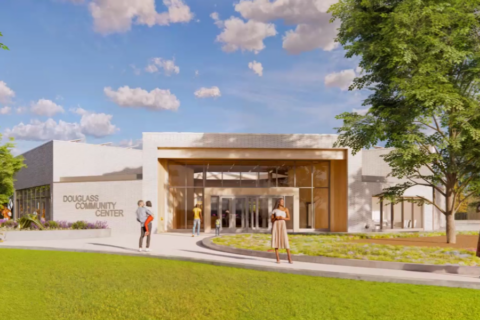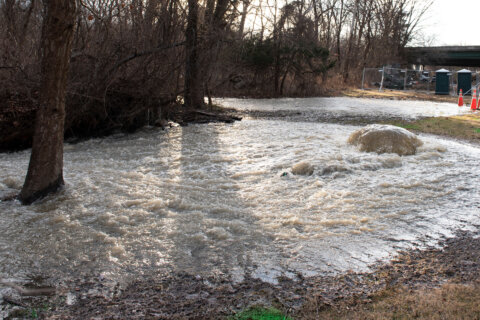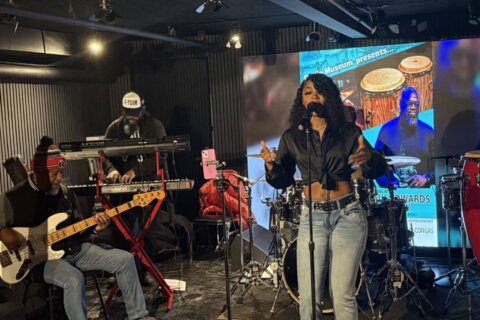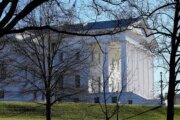The Washington Commanders are the closest they’ve ever been to returning to the old RFK Stadium site in D.C. — the NFL team’s home base from the days when it won three Super Bowls and captured the city’s attention each Sunday.
“The energy is palpable, it doesn’t matter where you go,” At-Large D.C. Council member Kenyan McDuffie said on the DMV Download podcast. “The Commanders belong in the District of Columbia.”
Three weeks ago, the Harris Group — led by D.C. native and billionaire Josh Harris — bought the Commanders from the loathed and liability-laden Dan Snyder. Two weeks ago, Congress introduced bipartisan legislation that would give D.C. the power to redevelop the RFK site.
And last week, the city took the first step by launching a “DC Sports study” that will work to select a contractor “to identify and recommend deal structures for financing DC sports facilities” at sites across the city, including RFK.
While a new Commanders stadium at the RFK site is far from a reality, McDuffie — who chairs the city’s Committee on Business and Economic Development — argued D.C. can’t miss this opportunity to bring the Commanders back to the District.
“We’ve got to bring the team home,” McDuffie said. “And my case for bringing the team back to the District of Columbia is really a simple one — the residents would like to see it.”
Despite McDuffie’s position and similar sentiment from Mayor Muriel Bowser, the District’s leadership remains split over whether they should build an NFL stadium in D.C.
‘Not a good investment’
Ward 6 Council member Charles Allen thinks it’s a bad idea.
“It’s pretty clear that NFL stadiums around the country don’t generate the jobs,” Allen said on the DMV Download. “They don’t generate the tax revenue and return. They’re not a good investment to your public dollars or good use of your land.”
Moreover, Allen argued that the council needs to shift its focus away from a possible Commanders stadium and dedicate time to revamping Capital One Arena — which comes as arena owner Ted Leonsis is reportedly exploring moving it outside the District.
“In 2027, the lease is up,” Allen said. “We’ve got to make sure that we keep that year-round activity happening at Capital One Arena. They’re active 250-plus days out of the year. There’s over $340 million worth of spending that happens in our city because of that venue.”
Allen said that D.C. can’t fund both the redevelopment of Capital One Arena and Nationals Park — and build a new NFL stadium.
“I don’t have just Monopoly money to say let’s just put money in and let’s build a stadium,” Allen said. “Serious people need to make serious decisions.”
And while a recent study does support Allen’s claims that NFL stadiums aren’t a good investment for cities, the same study does show civic pride increases with the construction of a new stadium. When asked whether this civic pride was worth the investment, Allen chuckled.
“Do you want to spend hundreds of millions of your tax dollars for that great feeling on Tuesday morning or on Monday morning after Sunday? Is that worth it?” he quipped. “I can feel just as proud of the team and have that little extra pep in my step when they win out in Landover.”
Allen went as far to say that he doesn’t want a stadium at the RFK site even if Harris and his group of investors promised to pay for all of it.
“Even if the team said we’re going to just build the stadium, but just give us the land, we would have immense costs from an infrastructure cost,” Allen said. “We would basically be locking in a large amount of land for a not optimal use of our limited land.”
To the councilman, “optimal use” is building affordable housing all the way up to the Anacostia River’s edge.
“That’s the opportunity and that’s really what we’ve got to go after,” Allen said.
‘A district of champions’
McDuffie sees things differently — he looks at a new NFL stadium as an economic boom for a struggling neighborhood.
“Having a stadium here, you don’t just get a stadium like RFK, you get potentially a world-class economic development project that brings thousands of jobs to Washingtonians and people who need those jobs,” McDuffie said.
And on Allen’s point that the city needs to revamp Capital One Arena and Nationals Park, McDuffie said he doesn’t think the city needs to be “pitting one sports team against another.”
“I don’t see it as a binary choice,” he said. “I think the possibilities are only limited by our imaginations.”
When asked about his vision for a new Commanders stadium, McDuffie said the 190 acres at the RFK site offer a lot.
“Nobody should envision just simply a stadium at that site and acres of parking,” McDuffie. “That’s not what I see.”
McDuffie, like Allen, wants to build affordable housing at the site, in addition to a new stadium.
When pressed on how he plans to fund this, he said it’s too soon to say. He added, though, that whether the city builds a stadium or housing or both, all of it is going to take significant money.
“Anything you do at that site, beyond what exists today, is going to cost money,” McDuffie said.
Unlocking potential
Despite their disagreement on building a new Commanders stadium at the RFK site, both Allen and McDuffie support legislation moving through Congress that would give the city a 99-year lease at the location.
“We’d like to get it passed throughout Congress so that we can get that 190 acres transferred to local elected officials so we can engage in a process that really has a community involved with it,” McDuffie said.
His colleague agreed.
“I think people need to take a beat,” Allen said. “We are at the very beginning of this and I think that people are excited. At some point, we’ll have to have a conversation, though, about what do we do with this land.”








